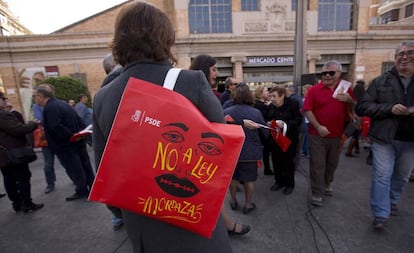Spanish government backtracks on reforms to controversial “gag law”
Pedro Sánchez’s administration has softened its hard-line position and wants to save key sections on express deportations and the filming of police officers


The Socialist Party (PSOE) government of Prime Minister Pedro Sánchez has softened its position on the reform of the Public Safety Law, better known by its nickname of the “gag law.”
According to various documents seen by EL PAÍS, the government wants to exclude from any reforms so-called “express deportations,” where migrants are immediately sent back to Morocco instead of being processed first in Spain, and other key aspects of the law that it had opposed while in opposition.
The government wants to exclude “express deportations” from the reform
The controversial legislation, approved by the Popular Party (PP) in 2015, was criticized from day one for impeding freedom of expression. Human rights activists have slammed the law for depriving citizens of their right to free speech, arguing cases such as that of Voltonyc, a Spanish rapper who was sentenced to three years in prison for insulting the king, show that it is “penalizing” legitimate expressions.
But while there is consensus that the legislation must be reformed, there is disagreement over the scope of the reform, which will be discussed on Thursday by a congressional Internal Affairs Committee.
Documents from the budget negotiations between the PSOE and the anti-austerity Podemos party show that the government wants to leave out its commitment to end “express deportations” on the border of the Spanish exclave cities of Ceuta and Melilla in North Africa. This is despite the fact that PM Sánchez signed an appeal before the Constitutional Court declaring that the practice was “arbitrary” and put the “physical and moral integrity” of deported migrants at risk.
The new position – publicly defended by Interior Minister Fernando Grande-Marlaska – argues that the new text should not address the issue until the European Court of Human Rights in Strasbourg reaches a decision on the express deportation of two migrants from Mali and the Ivory Coast. In October of last year, the court ruled that Spain had violated the European Human Rights Convention when it deported the two migrants, who crossed the border fence dividing Morocco and Spain. Spain was ordered to pay each of the migrants €5,000 in damages but has since filed an appeal against the ruling.
Since it was passed in 2015, the law has been criticized for restricting freedom of expression
According to different drafts of the agreement, Podemos asked for the case to at least be mentioned in the reform, but was turned down twice by the Spanish government.
The PSOE has also toned down its opposition to the sanctions against people who film and share images of police officers. While it previously wanted to eliminate the sanctions, which are included under Article 36.23, it now wants them to apply only when the use of the images “endangers the personal security” of the officers or their family, or endangers “the success of an operation.”
Podemos representatives, led by Ione Belarra, and a government delegation met for the first time on October 3 to discuss the reform of the Public Safety Law. The outcome of the negotiations was included in the budget agreement signed between Podemos leader Pablo Iglesias and Sánchez eight days later. The Spanish prime minister heads a minority government with just 84 lawmakers in the 350-seat Congress, and depends on support of the deputies from Podemos.
Ban on rubber bullets rejected
The government has rejected a proposal by Podemos to ban police from using rubber bullets in the reform of the Public Safety Law. According to the left-wing party, the projectiles have led to serious injuries and even deaths in Spain, such as in April 2012, when Íñigo Cabacas was killed when he was shot by the Basque regional police, the Ertzaintza, in Bilbao.
Podemos proposed changing Article 23, which concerns police actions in protests, to ensure officers are guided by a "focus on human rights" and prioritize "the right of assembly against control and security."
But this idea was turned down three times by the Spanish government, which argued that alternatives – such as foam bullets, which have been used by the Catalan regional police since 2014 – are no less dangerous.
English version by Melissa Kitson.
Tu suscripción se está usando en otro dispositivo
¿Quieres añadir otro usuario a tu suscripción?
Si continúas leyendo en este dispositivo, no se podrá leer en el otro.
FlechaTu suscripción se está usando en otro dispositivo y solo puedes acceder a EL PAÍS desde un dispositivo a la vez.
Si quieres compartir tu cuenta, cambia tu suscripción a la modalidad Premium, así podrás añadir otro usuario. Cada uno accederá con su propia cuenta de email, lo que os permitirá personalizar vuestra experiencia en EL PAÍS.
¿Tienes una suscripción de empresa? Accede aquí para contratar más cuentas.
En el caso de no saber quién está usando tu cuenta, te recomendamos cambiar tu contraseña aquí.
Si decides continuar compartiendo tu cuenta, este mensaje se mostrará en tu dispositivo y en el de la otra persona que está usando tu cuenta de forma indefinida, afectando a tu experiencia de lectura. Puedes consultar aquí los términos y condiciones de la suscripción digital.








































